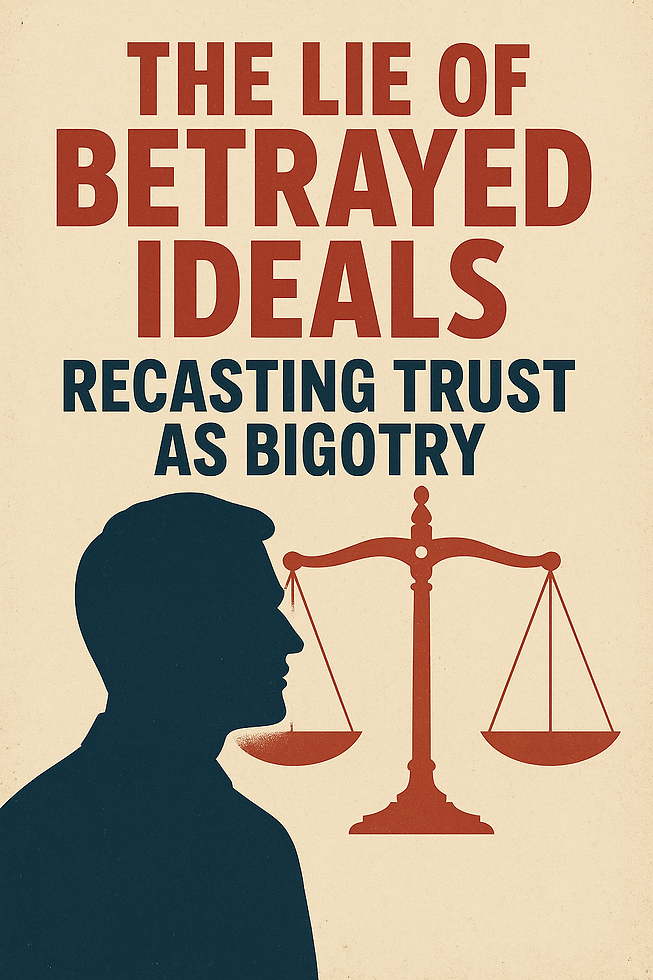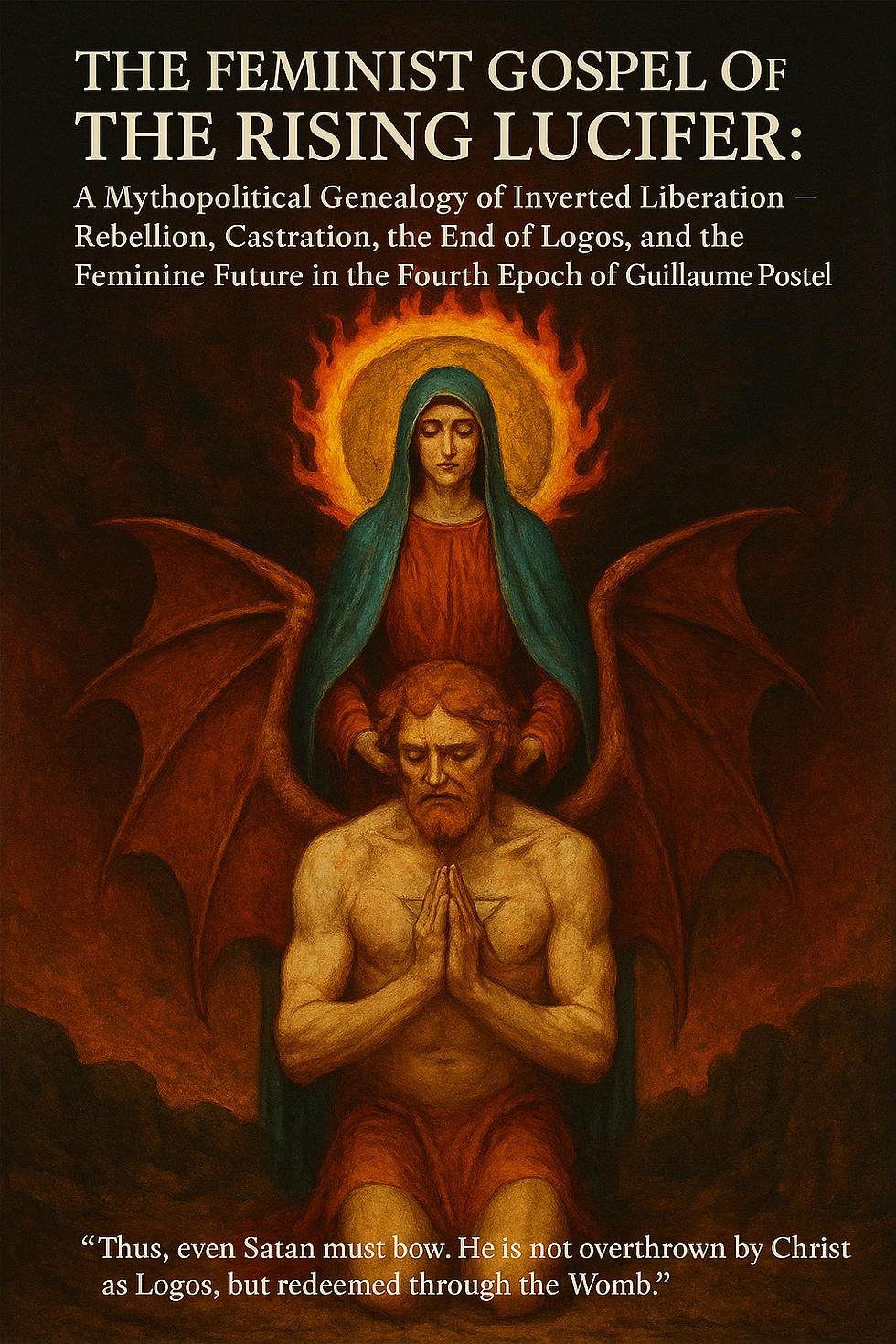
The Lie of Betrayed Ideals: Recasting Trust as Bigotry
- Yoav Levin

- 16 ביולי
- זמן קריאה 6 דקות
Kimmel’s next accusation is that white men—especially those who once believed in the promise of liberal progress—now feel betrayed by the very ideals they once championed: equality, justice, fairness. He frames their disillusionment as a kind of moral perversion: instead of blaming systems and institutions, these men allegedly lash out at women and minorities. Once again, Kimmel performs an act of ideological misdirection—this time, by substituting bad faith for broken promises, and framing betrayal as bigotry.
But this is not a matter of men scapegoating vulnerable groups. It is the natural consequence of having trusted a system that demanded their loyalty and sacrifice—and then abandoned them. These were the men who internalized the rules of meritocracy, who believed that hard work, responsibility, and civic decency would earn them stability, respect, and opportunity. What they received instead was dispossession. Factories closed. Housing costs exploded. Cultural esteem collapsed. Legal protection vanished. And with every new ideological wave—whether feminist, DEI, ESG, or intersectional—these men were told that their loyalty had not only expired, but had in fact always been illegitimate.
This is not a case of reactionary resentment. It is a betrayal of trust—a political and moral breach committed by the very institutions that promised justice. But Kimmel cannot allow that betrayal to be seen as structural. Instead, he rewrites the narrative: these men were never loyal to justice—they were loyal to dominance. Their heartbreak, therefore, is not the result of deception, but the withdrawal of privilege. Once again, Kimmel’s move is to deny men the moral standing to grieve. He reframes their disappointment not as the collapse of a social contract, but as the petulance of a fallen overlord.
Here, the Gramscian critique of hegemony becomes indispensable. The hegemonic bloc—composed of legal, academic, corporate, media, and feminist networks—requires a continuous narrative of forward progress. For that story to survive, male disillusionment must be recoded not as evidence of elite betrayal but as a failure of masculine ethics. Kimmel serves this function by acting as a moral interpreter. His job is to ensure that men do not turn their gaze upward—to the system—but sideways and inward, toward guilt, silence, and retreat.
Cognitive Gynocentric Telegony reinforces this process at the psychological level. Men are conditioned to view loyalty to liberal ideals as a form of virtue—but when that loyalty is punished, they are taught not to protest but to self-blame. Their trust becomes their shame. Their faith in fairness becomes evidence of their regression. They are, in effect, gaslit into believing that their belief in the system was itself the problem, and that those who betrayed them were actually their liberators.
Kimmel’s rhetorical trick here is particularly insidious. By suggesting that men now “blame women and minorities,” he sets up a convenient moral scapegoat—one that absolves the institutions, ideologies, and elites that actually engineered their downfall. The betrayal is real. But Kimmel’s narrative reassigns that betrayal to its victims, and replaces structural analysis with moral accusation.
In truth, these men do not reject equality—they reject false equality. They do not hate progress—they reject a progress that was purchased through their erasure. Their rage is not at inclusion, but at the coercive zero-sum game where their sacrifice is framed as supremacy, and their collapse as justice.
What Kimmel calls "aggrieved backlash" is in reality the awakening of political consciousness in those who were told they had no right to think, no right to feel, and no right to remember what they were promised. That memory, more than anything, is what the hegemonic system fears.
The Lie of Betrayed Ideals: Recasting Feminist Hegemony as Liberation
Michael Kimmel’s second major accusation against men is that they now feel betrayed by the very progressive ideals they once claimed to support — equality, justice, and fairness. According to Kimmel, these men nostalgically long for a time when their dominance was unchallenged, and when the American Dream promised reward for effort. But as women and minorities rise, he argues, these men react not with self-reflection or humility but with resentment, blaming the groups they once “helped” rather than the structures that actually changed. Here again, Kimmel performs a stunning rhetorical inversion — what should be analyzed as a rational response to betrayal by hegemonic institutions is instead moralized as bigotry, fragility, and failure to evolve.
Let us state plainly what Kimmel refuses to: the betrayal these men feel is not of progress itself, but of feminism as a hegemonic vehicle of elite control. Feminism, particularly from the second wave onward, did not remain a grassroots call for legal equality but became a superstructural ideological regime, embedded into the cultural, bureaucratic, legal, and academic apparatus of the West. It became the moral language of corporate HR, the axioms of school curricula, the sacred dogma of mass media, and the unassailable virtue of university discourse. In short, feminism became a pillar of the hegemonic bloc, as defined by Antonio Gramsci — not a subversive force fighting power, but a central engine of it.
Kimmel’s sleight of hand lies in erasing this transition. He frames feminism as the underdog, still rising against patriarchy — when in reality, feminism is the dominant moral authority of the post-industrial, neoliberal, techno-bureaucratic West. When men say they feel betrayed by progress, what they often mean — even if they cannot fully articulate it — is that they were gaslit into believing that feminism was about shared justice, only to find that it was about selective empowerment, legal asymmetry, and cultural replacement.
From the perspective of Cognitive Gynocentric Telegony (CGT), this betrayal is not just ideological — it is psychological and affective. Men were told they were the problem — not as individuals, but as a class. Every emotional signal of confusion, frustration, grief, or loss was reframed as proof of moral inferiority. They were trained to view their dispossession as just, their dissent as hatred, and their needs as toxic. CGT explains how this affective reprogramming works: men are systematically taught to disown their own experience and reinterpret all suffering through the lens of female-centered moral logic. This is not just socialization; it is affective occupation.
In Gramscian terms, the betrayal lies in how consent was manufactured and then weaponized. The white working- and middle-class men Kimmel derides were not born reactionaries. They believed in liberal promises. They supported civil rights. They tolerated and even promoted feminist reforms. They voted for progressive parties. They allowed themselves to be shamed, re-educated, and displaced in the name of fairness. They were, in Gramsci’s words, incorporated into the hegemonic project under the illusion that they were partners in a just transformation. But that transformation was never reciprocal. It was extractive — ideologically, economically, and psychologically.
What they learned too late was that feminism was not about equality, but asymmetry — a permanent moral double standard where women gained rights without responsibilities, and men retained responsibilities without rights. The “progress” Kimmel defends was not inclusive. It was selective. As shown in the research of Susan Carol Rogers, women held significant informal power long before formal legal equality — power over household finance, childrearing, social reputation, and kinship. Feminism reframed this hidden influence as historical oppression and demanded compensation — not equality, but redistributive supremacy.
Kimmel’s refusal to admit this dynamic reveals his role as an ideological commissar, not a sociologist. He is not explaining the world; he is disciplining those who reject its moral coding. When men resist feminist institutions — divorce courts, university speech codes, corporate DEI regimes — Kimmel accuses them of scapegoating minorities. But the truth is more uncomfortable: these men are breaking from the consensus they were trained to obey, and for that, they must be recast as moral criminals.
Kimmel cannot allow men to name the real betrayal — because that would expose the sacred cow of progressive academia: that feminism, far from being liberatory, is a tool of control. His accusation — that men are blaming the wrong people — is in fact a projection. It is he who misdirects blame, shielding the hegemonic alliance of feminist, neoliberal, and technocratic elites by setting up a scapegoat: the angry white man who refuses to disappear quietly.
In reality, these men are not enemies of justice. They are the canaries in the ideological coal mine — the first to feel the suffocating weight of a regime that talks equality but delivers inversion, dispossession, and humiliation. Their so-called betrayal of progress is nothing more than withdrawn consent — the exact point at which hegemonic legitimacy begins to crack.
Kimmel fears this moment. And so he pathologizes it. But the truth remains: if men are turning against progressive ideals, it is not because they are entitled — it is because those ideals were never what they claimed to be.
Reclaiming Masculinity: A Project in Critical Study Beyond Feminist Gender Theory
“Exploring Masculine Identity and Critiquing Feminist Orthodoxy from a Male-Affirming Perspective”




Comentários